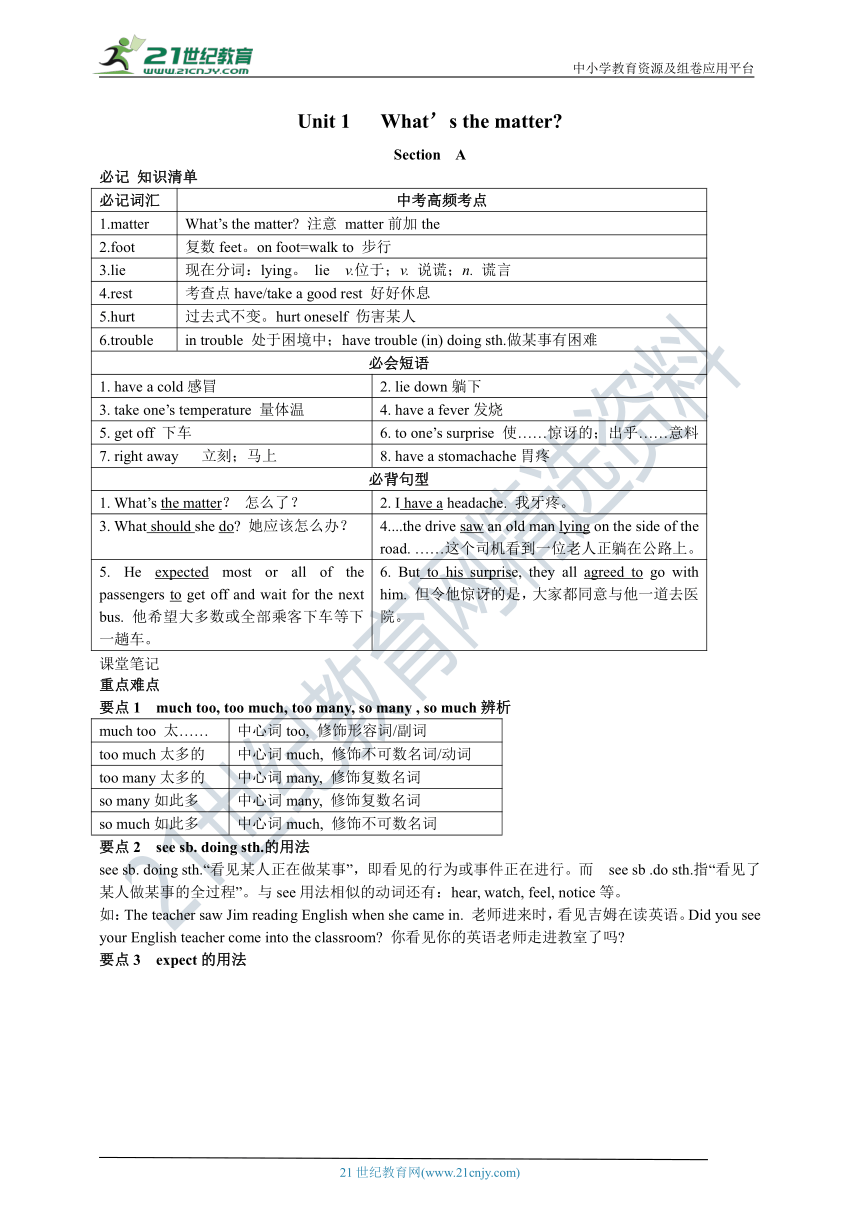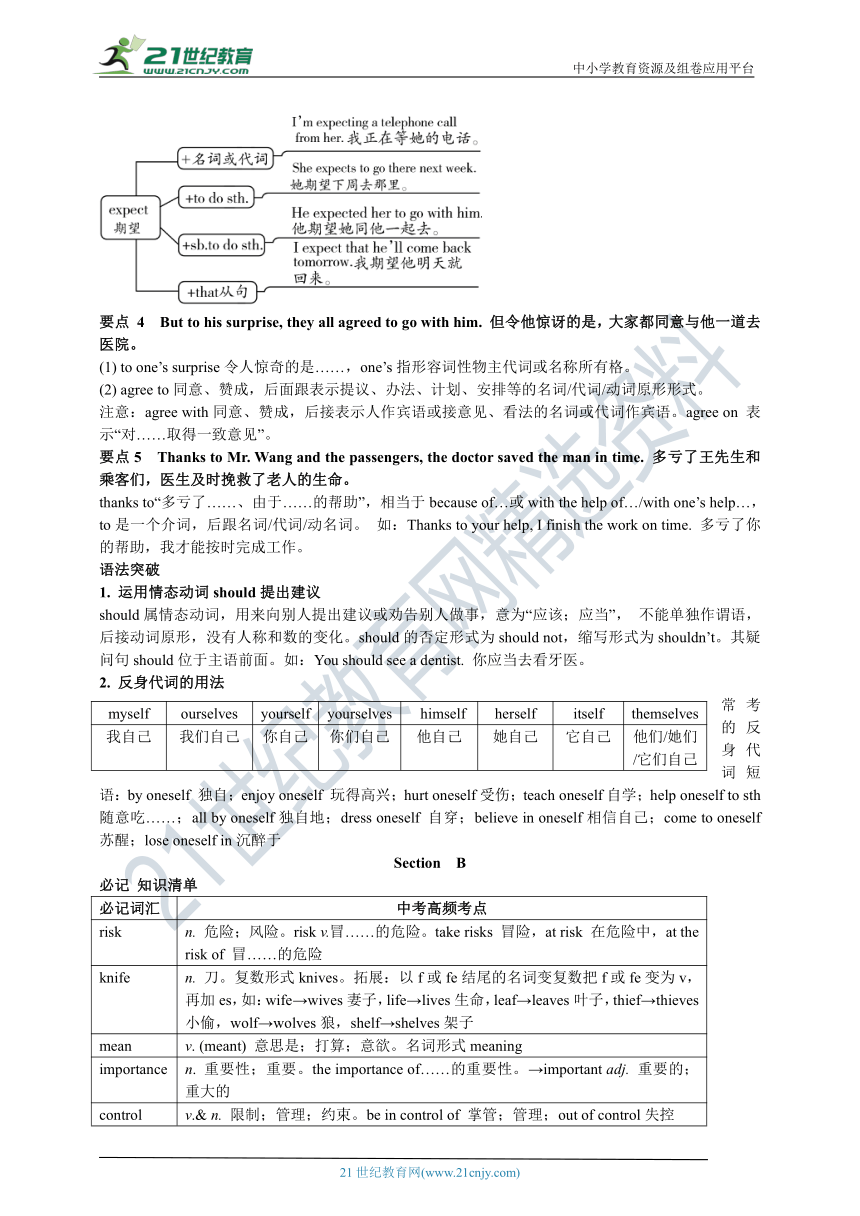Unit 1 What’s the matter 要点讲解
文档属性
| 名称 | Unit 1 What’s the matter 要点讲解 |

|
|
| 格式 | zip | ||
| 文件大小 | 1.2MB | ||
| 资源类型 | 试卷 | ||
| 版本资源 | 人教新目标(Go for it)版 | ||
| 科目 | 英语 | ||
| 更新时间 | 2019-03-04 00:00:00 | ||
图片预览


文档简介
中小学教育资源及组卷应用平台
Unit 1 What’s the matter?
Section A
必记 知识清单
必记词汇 中考高频考点
1.matter What’s the matter? 注意 matter前加the
2.foot 复数feet。on foot=walk to 步行
3.lie 现在分词:lying。 lie v.位于;v. 说谎;n. 谎言
4.rest 考查点have/take a good rest 好好休息
5.hurt 过去式不变。hurt oneself 伤害某人
6.trouble in trouble 处于困境中;have trouble (in) doing sth.做某事有困难
必会短语
1. have a cold感冒 2. lie down躺下
3. take one’s temperature 量体温 4. have a fever发烧
5. get off 下车 6. to one’s surprise 使……惊讶的;出乎……意料
7. right away 立刻;马上 8. have a stomachache胃疼
必背句型
1. What’s the matter? 怎么了? 2. I have a headache. 我牙疼。
3. What should she do? 她应该怎么办? 4....the drive saw an old man lying on the side of the road. ……这个司机看到一位老人正躺在公路上。
5. He expected most or all of the passengers to get off and wait for the next bus. 他希望大多数或全部乘客下车等下一趟车。 6. But to his surprise, they all agreed to go with him. 但令他惊讶的是,大家都同意与他一道去医院。
课堂笔记
重点难点
要点1 much too, too much, too many, so many , so much辨析
much too 太…… 中心词too, 修饰形容词/副词
too much太多的 中心词much, 修饰不可数名词/动词
too many太多的 中心词many, 修饰复数名词
so many如此多 中心词many, 修饰复数名词
so much如此多 中心词much, 修饰不可数名词
要点2 see sb. doing sth.的用法
see sb. doing sth.“看见某人正在做某事”,即看见的行为或事件正在进行。而 see sb .do sth.指“看见了某人做某事的全过程”。与see用法相似的动词还有:hear, watch, feel, notice等。
如:The teacher saw Jim reading English when she came in. 老师进来时,看见吉姆在读英语。Did you see your English teacher come into the classroom? 你看见你的英语老师走进教室了吗?
要点3 expect的用法
要点 4 But to his surprise, they all agreed to go with him. 但令他惊讶的是,大家都同意与他一道去医院。
(1) to one’s surprise令人惊奇的是……,one’s指形容词性物主代词或名称所有格。
(2) agree to同意、赞成,后面跟表示提议、办法、计划、安排等的名词/代词/动词原形形式。
注意:agree with同意、赞成,后接表示人作宾语或接意见、看法的名词或代词作宾语。agree on 表示“对……取得一致意见”。
要点5 Thanks to Mr. Wang and the passengers, the doctor saved the man in time. 多亏了王先生和乘客们,医生及时挽救了老人的生命。
thanks to“多亏了……、由于……的帮助”,相当于because of…或with the help of…/with one’s help…,to是一个介词,后跟名词/代词/动名词。 如:Thanks to your help, I finish the work on time. 多亏了你的帮助,我才能按时完成工作。
语法突破
1. 运用情态动词should提出建议
should属情态动词,用来向别人提出建议或劝告别人做事,意为“应该;应当”, 不能单独作谓语,后接动词原形,没有人称和数的变化。should的否定形式为should not,缩写形式为shouldn’t。其疑问句should位于主语前面。如:You should see a dentist. 你应当去看牙医。
2. 反身代词的用法
myself ourselves yourself yourselves himself herself itself themselves
我自己 我们自己 你自己 你们自己 他自己 她自己 它自己 他们/她们/它们自己
常考的反身代词短语:by oneself 独自;enjoy oneself 玩得高兴;hurt oneself受伤;teach oneself自学;help oneself to sth 随意吃……;all by oneself独自地;dress oneself 自穿;believe in oneself相信自己;come to oneself苏醒;lose oneself in沉醉于
Section B
必记 知识清单
必记词汇 中考高频考点
risk n. 危险;风险。risk v.冒……的危险。take risks 冒险,at risk 在危险中,at the risk of 冒……的危险
knife n. 刀。复数形式knives。拓展:以f或fe结尾的名词变复数把f或fe变为v,再加es,如:wife→wives妻子,life→lives生命,leaf→leaves叶子,thief→thieves小偷,wolf→wolves狼,shelf→shelves架子
mean v. (meant) 意思是;打算;意欲。名词形式meaning
importance n. 重要性;重要。the importance of……的重要性。→important adj. 重要的;重大的
control v.& n. 限制;管理;约束。be in control of 掌管;管理;out of control失控
spirit n. 勇气;意志;精神。the spirit of ……的精神;in a spirit of 以……态度
必会短语
1. be used to习惯于……;适应于…… 2. run out (of )用尽;耗尽
3. cut off 切除 4 get out of离开;从……出来.
5. give up放弃
必背句型
1. Aron Ralston is an American man who is interested in mountain climbing.阿伦·罗尔斯顿是一位对登山感兴趣的美国人。 2. As a mountain climber, Aron is used to taking risks.作为一名登山者,阿伦习惯于冒险。
3. Then, with his left arm, he bandaged himself so that he would not lose too much blood. 然后,用左胳膊对自己进行了包扎,以至于不会失血过多。 4. … Aron tells of the importance of making good decisions, and of being in control of one’s life.……阿伦讲述了做正确决定的重要性,以及掌握命运的重要性。
5. His love for mountain climbing is so great that he kept on climbing mountains even after this experience. 他对登山的挚爱如此的强烈以至于经过这次经历后,他仍然继续登山。
重点难点
要点1 sick,ill辨析
sick 作“生病的”解时,既可作表语(此时相当于ill),也可作定语
ill 作“生病的”时只作表语,不作定语,比较级,最高级为worse,worst
要点2 die,died,dying,death辨析
die die动词“死,死亡”,是非延续性动词,不能同表示一段的时间状语连用
dead dead 形容词“死的、无生命的”,表示状态,可以同表示一段时间的状语连用。如果表达“死了多长时间”,用“have(has)been dead for+时间”或“died+时间段+ago”
dying die的现在分词,作定语或表语“垂死的、要死的”
death death 是名词“死、死亡”,在句中作主语或宾语
要点3 be used to (doing) sth.的用法
be used to (doing) sth“习惯于做某事”, to是介词,后接名词/代词/动名词。be也可换get, become。如:He is used to living in the city. 他习惯住在城市。
要点4 because of,because的用法
because of “因为”是介词短语,后接名词/代词/动名词。because of引导的句子是简单句,because of 后面不能接从句。而because 是从属连词“因为”,引导原因状语从句。如:He didn’t go to school because of illness. = He didn’t go to school because he was ill. 他因病而没去上学。
要点5 so that的用法
so that相当于in order that/in order to,用作连词短语,“以便,为的是”,引导目的状语从句/结果状语从句。如:They climbed higher so that they might see farther. 他们爬得更高,以便看得更远。
要点6 give up 的用法
give up“放弃”,后接名词/代词/动词-ing形式,接代词作宾语时,要把代词放于give和up之间。
写作提升
【写作目标】本单元的话题是对健康问题提出合理化的建议,话题贴近生活,关于健康问题运用should/ shouldn’t提出更加正确、具体和深入的合理化建议。
【写作指导】1. 针对健康问题,一般是记叙文,时态为一般现在时。
2. 人称,由于是给提出建议,多为第二人称。
3. 写作思路:首先是客套语,对疾病方的病情感到遗憾;担心;接着是给疾病方的合理化建议,使其更加健康;最后是祝福语,表达对健康的祝福。
4. 注意事项:正确使用身体部位疾病的词语表达,恰到好处使用should/ shouldn’t给出更加健康的合理建议。
【亮句积累】
1. I am very sorry to hear that you have a bad cold. 我听说你患重感冒我很难过。
2. You should lie down and have a good rest. 你应该躺下了好好休息。
3. I hope you will get well soon. 我希望你不久会好的。
【范文借鉴】
范文 亮点借鉴
Dear Nancy,①I’m sorry to hear your problem. Everyone gets tired sometimes,but you always feel tired. ②I think you should eat hot food, like beef and go to bed early for a few nights to have a good rest. On the other hand, you shouldn’t worry about your exams. You shouldn’t study when you are tired. You can listen to music to relax.③I hope you will get well soon. Yours, Tom ①对方的问题应该首先是难过和担心,效果很好。②建议运用了丰富的句型:I think you should...;On the other hand,you shouldn’t...;You can...,这些都运用得比较恰当,表现了作者较高的写作水平。③对对方的祝福语,恰到好处,感情真挚。
21世纪教育网 www.21cnjy.com 精品试卷·第 2 页 (共 2 页)
HYPERLINK "http://21世纪教育网(www.21cnjy.com)
" 21世纪教育网(www.21cnjy.com)
同课章节目录
- Unit 1 What's the matter?
- Section A
- Section B
- Unit 2 I'll help to clean up the city parks.
- Section A
- Section B
- Unit 3 Could you please clean your room?
- Section A
- Section B
- Unit 4 Why don't you talk to your parents?
- Section A
- Section B
- Unit 5 What were you doing when the rainstorm came
- Section A
- Section B
- Review of Units 1-5
- Unit 6 An old man tried to move the mountains.
- Section A
- Section B
- Unit 7 What's the highest mountain in the world?
- Section A
- Section B
- Unit 8 Have you read Treasure Island yet?
- Section A
- Section B
- Unit 9 Have you ever been to a museum?
- Section A
- Section B
- Unit 10 I've had this bike for three years.
- Section A
- Section B
